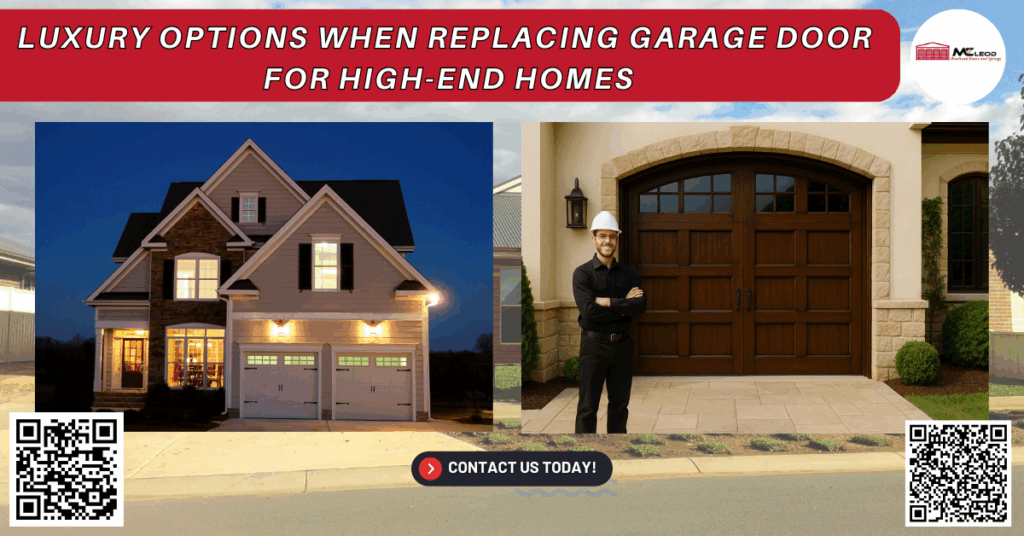Not long ago, a family from Baytown reached out to us with a concern that many Central Texas homeowners can relate to. Their garage felt like a furnace during summer and an icebox in the winter. The garage door was an old, uninsulated model that lacked the energy-saving features common in today’s modern garage doors. They were interested in replacing garage door with something more efficient. We recommended a high-quality, insulated steel door with polyurethane foam insulation, and the transformation was immediate. Their garage became significantly more comfortable, quieter, and more energy-efficient, ultimately lowering their monthly energy bills and protecting their belongings from temperature extremes.
According to the U.S. Department of Energy, up to 30% of heating and cooling energy can be lost through poorly insulated doors, including garage doors. In Central Texas, where the heat can be intense and sudden cold snaps are not uncommon, replacing garage door with an insulated option is not just a luxury, it’s a smart investment. Whether you use your garage as a workspace, storage area, or extension of your living space, insulation matters.
If you’re considering replacing your garage door, this comprehensive guide will walk you through the best insulated options, their benefits, materials, installation tips, maintenance advice, and how our expert team at McLeod Overhead Doors and Springs can assist you every step of the way.
Why Insulation Matters for Garage Doors in Central Texas
Insulation plays a vital role in your garage door system. In the hot, humid climate of Central Texas, insulation helps regulate indoor temperatures, reduce heat transfer, and maintain comfort inside your garage. This is especially important if your garage is attached to your home or if it contains temperature-sensitive items like electronics, tools, paint, or even workout equipment.
Insulated garage doors provide:
- Energy Efficiency: By reducing the need for extra heating or cooling, insulated doors help you save money on utility bills and extend the life of your HVAC system.
- Noise Reduction: Insulated panels and internal foam can dampen noise from outside, giving your garage and home a quieter environment.
- Increased Strength: Multi-layer doors with insulation, such as polyurethane or polystyrene, offer higher durability and resist denting, warping, and corrosion.
- Improved Safety: Insulated garage doors often include enhanced safety features like reinforced tracks, stronger torsion springs, and safety sensors.
- Better Comfort: Whether you use your garage as a home gym, workshop, or laundry area, insulation makes it more livable.
These benefits contribute to your home’s overall appearance, curb appeal, and even return on investment when it’s time to sell.
Types of Insulation Used in Garage Doors
When it comes to insulation, garage doors typically use one of three main materials. Each type has its insulation value, measured by R-value, which indicates how well the material resists heat flow.
1. Polystyrene Insulation (Expanded Foam Panels)
- Provides basic thermal resistance with an R-value of around 6-9.
- Lightweight and cost-effective.
- Typically placed between two steel layers or attached to the back of single-layer doors.
- Offers limited soundproofing and structural support.
- Suitable for moderate use and budget-conscious homeowners.
2. Polyurethane Insulation (Injected Foam)
- Offers the highest R-value, often ranging from 12 to 18+.
- Injected between the door panels to bond with the interior.
- Adds structural strength and improves durability.
- Excellent for extreme temperatures and sound dampening.
- Ideal for attached garages or frequent-use garage doors.
3. Multi-layer Insulated Steel Doors
- Also known as “sandwich” doors, they combine steel, insulation, and more steel.
- Extremely durable, secure, and thermally efficient.
- Common in both residential and commercial applications.
- Perfect for high-traffic garages or businesses needing climate control.
Best Materials for Insulated Garage Doors
Material selection significantly affects insulation performance, garage door cost, durability, and aesthetics. When replacing your garage door, consider these popular materials:
Steel Garage Doors
- The most popular material for insulated garage doors.
- Offers superior strength, security, and resistance to the elements.
- Compatible with both polystyrene and polyurethane insulation.
- Available in various styles, including modern, traditional, and carriage house designs.
- Works well with smart features and garage door openers like LiftMaster and Chamberlain.
Wood Garage Doors with Insulation
- Provide natural beauty and custom designs.
- Can be built with insulation layers, though generally with lower R-values than steel.
- Require regular maintenance to prevent warping, moisture damage, and wear.
- Suitable for historic or upscale homes.
Aluminum and Glass Garage Doors
- Sleek and contemporary appearance with natural light.
- Use insulated glass and aluminum frames.
- Not as thermally efficient as steel, but suitable for mild climates or commercial storefronts.
- Compatible with smart garage systems and security features.
Energy Efficiency and R-Values: Why They Matter
The R-value of your garage door determines how well it insulates against outdoor temperatures. Central Texas homeowners should aim for an R-value of at least 9 to 18, depending on their needs.
High R-value doors are especially important if:
- Your garage is attached to your home.
- You use the garage as a living space or workspace.
- You store items sensitive to temperature changes.
- You want to reduce HVAC usage and save on energy costs.
Foam insulation types like polyurethane are excellent for high R-value needs, offering thermal protection, strength, and quieter operation.
Best Insulated Garage Doors for Residential Homes
Amarr Classica Collection
- Triple-layer steel with polyurethane insulation.
- High R-value (13.35+).
- Carriage house style with modern materials.
- Available in various colors and panel styles.
Clopay Gallery Series with Intellicore
- R-values up to 18.4.
- Uses Intellicore® polyurethane foam for high energy efficiency.
- Compatible with garage door openers and smart garage door systems.
- Durable and ideal for everyday residential use.
Wayne Dalton Model 9700
- Combines wood-look fiberglass with thermal insulation.
- R-value around 10.
- Ideal for homes seeking curb appeal and weather resistance.
Best Insulated Garage Doors for Commercial Properties
Raynor ThermoSpan Series
- Offers maximum thermal protection with polyurethane insulation.
- R-values up to 26.
- Strong steel construction with corrosion-resistant finishes.
- Great for warehouses, auto shops, and service bays.
Overhead Door Thermacore Series
- R-values between 12 and 17.5.
- Designed for heavy-duty commercial use.
- Provides security, energy savings, and quiet operation.
Key Factors to Consider When Replacing Garage Doors
When selecting the right garage door, keep the following factors in mind:
- Climate: Choose insulation levels that match Central Texas temperatures.
- Garage Usage: Workspaces or attached garages need higher R-values.
- Door Springs: Torsion springs offer better balance and durability than extension springs.
- Panels and Tracks: Look for steel-reinforced panels and strong tracks for smooth operation.
- Safety Features: Include pinch-resistant panels, safety sensors, and backup batteries for openers.
- Cost and ROI: Insulated doors cost more upfront but save money long-term.
- Appearance: Match door style and color to your home’s architecture.
- Smart Features: Consider wi-fi connectivity, smartphone control, Amazon Alexa compatibility, and security camera integrations.
Maintenance Tips for Insulated Garage Doors
Regular garage door maintenance ensures longevity and performance. Here’s a step-by-step guide:
- Inspect springs (torsion or extension) and cables for signs of wear.
- Clean panels with mild detergent every few months.
- Lubricate moving parts, including rollers, hinges, and tracks.
- Check the opener system, especially if using smart garage tech.
- Test safety sensors and backup battery monthly.
- Examine weather stripping for cracks or wear.
- Schedule annual professional inspections for comprehensive checks.
Proper upkeep prevents costly repairs, improves safety, and ensures smooth operation year-round.
How Can McLeod Overhead Doors and Springs Help You?
At McLeod Overhead Doors and Springs, we are proud to serve Baytown, TX, and all of Central Texas with top-quality garage door services. From selecting the perfect new garage door to installation, garage door replacement, and ongoing maintenance, we offer a full range of residential and commercial solutions.
Our expert technicians are highly trained in everything from garage door springs, panels, and openers to high-tech smart garage door systems. We carry premium brands including LiftMaster and Chamberlain, and our installations feature energy-saving insulation, modern safety features, and strong warranties.
Whether you’re replacing an old door, looking to upgrade to a smart garage system, or want to boost your home’s energy efficiency, we have the tools, experience, and materials to get the job done right.
Don’t wait until your garage becomes unbearable during the next Texas heatwave.
✉️ Visit us today at: 8820 N Hwy 146, Baytown, TX 77520
📞 Call now: (281) 603-2885
Let us show you why we’re one of the top garage door companies in Central Texas. Get your free quote and consultation today!
Frequently Asked Questions (FAQs)
1. How long does an insulated garage door typically last?
An insulated garage door can last 20 to 30 years with proper installation and regular maintenance, depending on material and usage.
2. Can I add insulation to my existing garage door instead of replacing it?
Yes, insulation kits are available for retrofitting old doors, but they won’t offer the same efficiency, durability, or noise reduction as a professionally installed insulated door.
3. Does insulation help with garage door opener performance?
Yes, insulated doors are often better balanced and quieter, which can reduce strain on the garage door opener and extend its lifespan.
4. Are insulated garage doors worth the higher cost?
Absolutely, while the upfront cost is higher, the long-term energy savings, improved comfort, and increased property value often make it a worthwhile investment.

